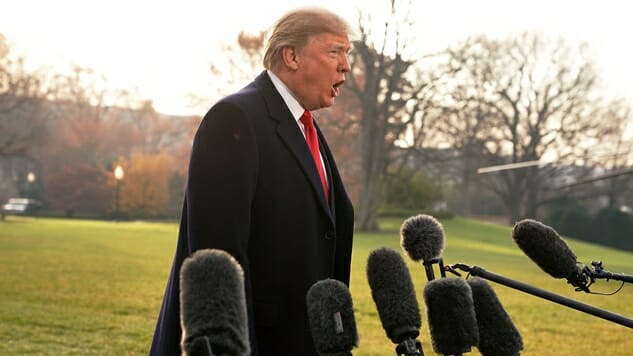What Is the Point of Fact-Checking Trump?
Photo by Alex Wong/Getty
I realize that this is a title that sort of answers itself. Journalism is about properly contextualizing facts and so at its core, fact-checking is nothing more than the pure essence of journalism. Without knowing facts, we cannot prescribe solutions to the litany of problems that we face in our modern politics. That said, Trump is playing an entirely different game, and given that he won the presidency, we need to consider what made him so effective.
Trump is a lying liar who lies. You don’t need to pay attention to politics to know this. The Washington Post’s end-of-year fact-checker on Trump’s avalanche of lies is helpful from the standpoint that we can specifically point out his falsehoods, but what is the end-result of highlighting them? What are we getting out of this endeavor? That’s what my title is getting at.
Jon Stewart’s The Daily Show helped raise an entire political generation (including myself), and it was a revelation not just because of his skewering of the Bush Administration, but because of how he did it. By simply showing video of contradictory statements by politicians, Stewart filled a vacuum created by a mainstream media who all too often used their platform to give a megaphone to politicians instead of scrutinizing them. Stewart created a model for journalism that you can still see today on shows like Jake Tapper’s on CNN.
While this kind of “by your logic” journalism was useful from the standpoint of bringing attention to the atrocities of the Bush Administration, it’s questionable how much it did to actually sway folks’ opinions. Plenty of studies have shown that logic is simply not how you convince people of an argument. I did sales for nearly a decade before being hired by Paste, and all of my training at each job was centered around making an emotional argument to convince folks to buy our product. Here’s an example.
I worked in merchant services (if you own a business, please read this column I wrote as a mea culpa for all the industry shadiness that I was a party to), and it was my job to sign business owners up for a merchant account so they could accept credit and debit cards. Logically, the only thing that really matters are the rates you’re paying. That’s why people called us and it was always the first question out of their mouths.
We were trained not to give away that information right away, and instead ask them questions about their business. Part of this was practical—there are different rates depending on whether you’re an online or brick-and-mortar business—but the main reason we were trained to ask about their businesses first was to get them talking about something they liked. It was then our job to turn on the sales charm and flatter them about their business, essentially trying to make the sale before we even got into the main reason why they called.
-

-

-

-

-

-

-

-

-

-

-

-

-

-

-

-

-

-

-

-

-

-

-

-

-

-

-

-

-

-

-

-

-

-

-

-

-

-

-

-








































